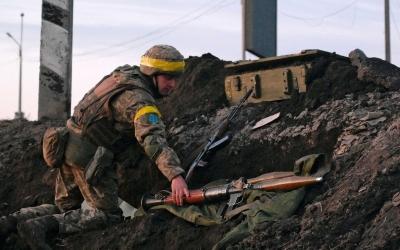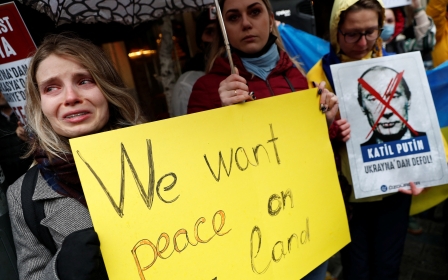Arabic Press Review: Middle East braces for food and fuel shortages after Russian invasion

Yemen and Tunisia: Concerns grow over food and fuel supplies
Several Arab countries, including Yemen and Tunisia, have been looking for alternative ways to meet their fuel and food needs in light of the Russian invasion, London-based Al-Araby Al-Jadeed newspaper reported.
Yemen's commercial and economic sectors are anxious about the conflict's repercussions, especially if Russia and its allies further tighten their blockade on Yemeni ports and commercial shipping, according to Ahmed Hassan, a media and communications official in Yemen's central chamber of commerce and industry.
Abd al-Salam al-Aghbari, a grain trader, said that the Yemeni market depends mainly on wheat imported from Russia and Ukraine.
Yemen imports most of its wheat from Russia, Australia, Ukraine and America. Commercial sources confirm that wheat is imported through Arab countries such as Egypt, which in turn depends on imports from Russia and Ukraine.
In Tunisia, which imports about 80 percent of its grain from Ukraine, concerns are growing following the outbreak of the war.
In addition to the possible disruption of wheat shipments, Tunisia's budget has already come under pressure due to an oil price surge in the global market.
The Tunisian government this year budgeted for fuel at an average price of $75 a barrel, but the global market price continues to rise and is now over $100 a barrel.
Tunisia may have to adjust its needs for external loans in order to provide a foreign currency balance sufficient to secure basic imports based on the new global prices, said economist Ridha Al-Shakandali.
Syria: Government tightens hold on fuel supplies
The Syrian government is planning to carry out a number of austerity measures in light of the Russian invasion of Ukraine and its potential impacts on Syria's economy, according to Saudi newspaper Asharq Al-Awsat.
The government announced its intention to develop a plan over the next two months to regulate the distribution of all oil derivatives and to gradually reduce the quantities that are being supplied to the market.
Government officials met in Damascus to discuss possible economic fluctuations that could directly or indirectly affect local markets, particularly energy, food and transport, said the newspaper.
The government also decided to tighten controls on the exchange market to keep it stable.
Kuwait: Wheat stocks good for at least a year
Kuwait has enough wheat and grains to last more than a year, the local Al-Qabas newspaper reported, amid widespread anxiety over the impact of the Russian invasion of Ukraine.
Both Russia and Ukraine are key suppliers of the world's wheat, barley and other staple grains. The eastern regions of Ukraine, which are most vulnerable to a Russian attack, contain its most-productive farmland.
Kuwait's annual volume of imports from Ukraine is worth around 13 million dinars ($43m), most of which are non-food items, a government source told Al-Qabas.
The country's strategic rice stock is sufficient for Kuwaitis for a period of two years, as "the largest proportion of foodstuffs in the local market is imported from Asia, Europe and Africa, not from the current area of operation," according to the source.
"The strategic stock of basic materials in the country is at its highest levels, and there are cargo ships on their way to Kuwait from Australia and South America loaded with basic foodstuffs."
The source offered reassurance to Kuwaitis while warning that other costs could spike if the Russia-Ukraine conflict drags on, such as shipping and insurance, for example.
*Arabic press review is a digest of news reports not independently verified as accurate by Middle East Eye
Middle East Eye delivers independent and unrivalled coverage and analysis of the Middle East, North Africa and beyond. To learn more about republishing this content and the associated fees, please fill out this form. More about MEE can be found here.






